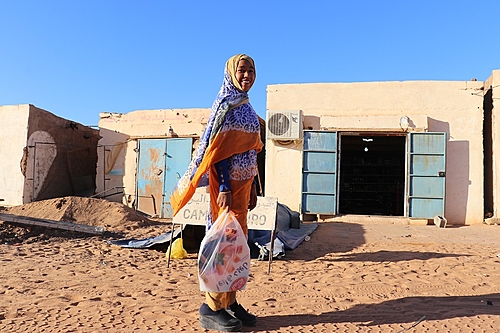
On this International Women’s Day, the Sahrawis propose to expand the discussion on individual freedoms, when one does not have the sovereign right to the territory. Western Sahara is considered the last colony in Africa: from the 19th century until 1975 it was under the domination of the kingdom of Spain and is again at war against the invasion of Morocco.
“The work is the same, while we don’t have the right to our territory, we work twice as hard”, argues Chaba Seini, general secretary of the Union of Sahrawi Women (UNMS).
The organization was created in 1974, just one year after the Polisario Front was founded, demonstrating the weight of the female vanguard in the struggle for independence in Western Sahara.
UNMS is part of the World March of Women and held its vice-presidency for almost a decade.
:: The struggle of women in Western Sahara: an activist tells the story of a people under occupation ::
Saharawi delegates in line to attend the 16th Congress of the Polisario Front, held in January 2023, in Algeria / Michele de Mello / Brasil de Fato
Despite having a history of political leadership in their country and internationally, Sahrawi women report that there are still cultural barriers to be overcome, especially when it comes to women’s relationship with religion.
“Islam was not created against women, nor against men, but each one practices it from their own point of view. The Sahrawi woman has always been Muslim, but she has never let Islam be a barrier to her work or to what she does. want to do,” explains Chaba.

In Western Sahara each person must drink three cups of tea: the 1st bitter as life, the 2nd sweet as love and the 3rd smooth as death. / Michele de Mello / Brasil de Fato
Being built on a nomadic society, the Sahrawi Republic has always adopted a liberal reading of the Koran.
“Obviously the problem is that we have a Western approach, with a Western feminism that is not very inclusive not only of Muslim women, but of women of color. We continue to apply colonial standards to feminism”, says Tesh Sidi, a young Sahrawi.
But he warns: “the Sahrawi woman is not free from the patriarchal standards that are also expressed in a tribal society of people living in exile”.

Tesh Sidi with his Saharawis Today colleagues covering the 16th Congress of the Polisario Front in January 2023 in Algeria / Michele de Mello
Tesh is yet another example of the autonomy of Sahrawi women. Daughter of two refugees, her father was an officer in the People’s Army for 17 years and her mother took on the care and literacy work of her seven children. Upon finishing high school, Tesh left the refugee camps in Tindouf, Algeria, to study in Spain. Today she is a computer engineer specializing in big data (big data processing) and founded the Saharawis Today portal to inform the world about the resistance of its people.
“We’ve always had a lot of respect for the Saharawi man and we’ve been respected. This didn’t start with the revolution, the Saharawi people are like that”, adds Chaba Seini.

Henna tattoos are a form of expression of the Saharawi culture and a gift from women to those who come to the community of Dajla / Michele de Mello / Brasil de Fato

Women were also responsible for keeping the Sahrawi culture alive, through oral transmission and daily practice.
“Salam Aleikum achalcum iyak labas achkif alaila umunan yyak ala labas” the greeting is an expression of the warmth of the Saharawi people and means: “Hello, how are you, how is your family, how is your health and that of your family”, and even without the control of Western Sahara and in a situation of refuge, the Sahrawis maintain the greeting of a nomadic people.
Upon arriving at Dajla’s camp, the women welcome her with displays of affection. deliver a Melhfa (Saharawi clothing), which helps to protect oneself from the sun and sand of the Sahara desert.
In addition, it is customary to receive visitors, offer hand cream and body perfume. To the James (tents) are also scented with incense each time Sahrawi tea is prepared – another ritual that is maintained. In Western Sahara each person must drink three cups of tea: the first as bitter as life, the second as sweet as love, and the third as smooth as death.

The matriarch of the Mohamed Ali family was the one who taught the technique of henna tattooing to her daughters and granddaughters / Michele de Mello / Brasil de Fato
In a reserved environment, with only women, the Sahrawis sing their songs of resistance, dance and draw arabesques with henna on their hands, arms and face, which reinforces their identity.
“For us, culture is very important, because it is what differentiates us from the Moroccans who insist on invading our territory and trying to erase our history”, says the Minister of Cooperation Fatma Mehdi.
Tradition, in this case, also goes hand in hand with a modern view of Islam. In Dajla it is common to have young people who are not interested in getting married or having children and yet the fact is not a taboo for Sahrawi society.
“In our culture we always process Islam in a free, individual and very respectful way”, reports Tesh Sidi.
For the new generations, despite the historical achievements and the leading role of Sahrawi women, it is necessary to advance in other areas.
“It is important to be critical. We have to recognize the achievements, but we cannot lose ourselves. The strategy of the Sahrawi woman must be to occupy decisive political positions and that show the strength of the Sahrawi woman beyond the care of the family”, defends the engineer Tesh Sidi.
For Chaba Seini, the Sahrawi woman knows that she must fight until she gains her independence. “We are prepared for anything. The Polisario Front has opened up the entire organization so that women can play whatever role they want,” she said.
“I trust the women of my people and we are going to move forward. The Sahrawi people will win. This is a historic fact that will happen”, concludes Tesh Sidi.
Editing: Patricia de Matos
Source: www.brasildefato.com.br

